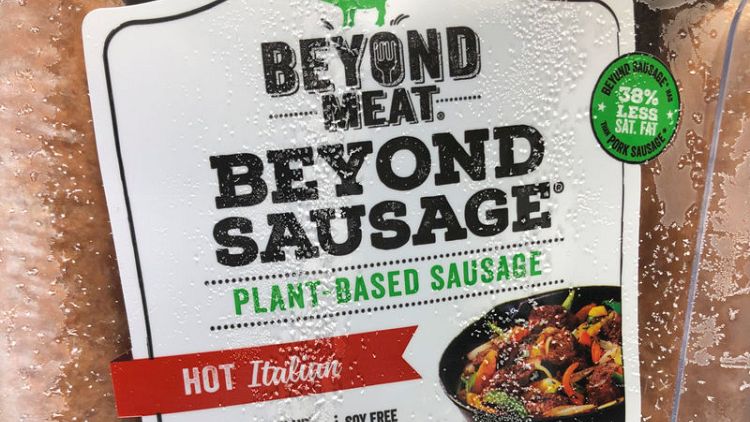By Noel Randewich
SAN FRANCISCO (Reuters) - U.S. consumers hankering for one of Beyond Meat Inc's faux-meat burgers can pick one up at the grocery store for about $3 a patty.
That is a fraction of what they are going for on Wall Street, where investors looking to get a serving of the food producer's sizzling stock appear to be laying down the equivalent of more than $50 a burger.
Nailing down just how much Beyond Meat is worth is one of the hottest topics on Wall Street following a nearly 500% surge in its stock since its initial public offering on May 2.
The company has attracted investors betting it will become the dominant player in the nascent market for plant-based hamburgers, sausages and other meat alternatives, even though the company has yet to turn a profit.
With ground beef retailing in grocery stores for the equivalent of $1 or less per 4-ounce (113 gram) burger patty, according to the U.S. Department of Agriculture, Beyond Meat's early success in grocery store meat sections shows a market exists for premium-priced burger products made with or without animal.
At nearly $9 billion (£7.09 billion), Beyond Meat's market capitalisation rivals several mature food companies. Poultry producer Pilgrim's Pride checks in at $6 billion, for instance, while Campbell Soup Co sports a stock market value of $12 billion.
So far, the Wall Street establishment does not see that price tag as justified. The eight analysts covering the stock have price targets ranging from 11% to 46% below Beyond Meat's current share price of around $144, following its recent rally.
Preferred valuation measures like the price to earnings ratio are not useful because Beyond Meat is losing money and is unlikely to record a profit for at least another year or so.
Meanwhile, the stock is trading at 38 times this year's Wall Street revenue estimate, making it more expensive on that basis than all but a handful of U.S. stocks even as it faces competition from larger, profitable rivals including Nestle, the world's largest packaged foods group.
Graphic: Beyond Meat's burger multiple (https://tmsnrt.rs/2FvFK4S)
PATTIES PER SHARE?
Beyond Meat is increasing sales of its Beyond Sausage and other products, but the Beyond Burger remains its flagship offering.
The company sold 15.2 million pounds of food last year, equivalent to 61.0 million 4-ounce patties, the weight of the Beyond Burger sold in supermarkets. That puts the company's current market capitalization at the equivalent of $143 per Beyond Burger patty sold last year.
Analysts on average expect Beyond Meat's revenue to surge 152% this year to $221 million, according to Refinitiv.
Conservatively assuming no price increases, it would be on track to sell 153 million patties in 2019, making its current stock market value equivalent to $57 per 4-ounce patty sold in 2019.
A Beyond Meat spokesperson declined to give details on sales of specific products or the weight of its burgers sold through restaurants.
While investors do not typically value companies by comparing stock prices to unit sales, the high price they are paying - at least in terms of burger patties - to own a stake in Beyond Meat's future signals a lofty valuation, even as competition grows.
Impossible Foods has started selling its Impossible Burgers through restaurants including Burger King, Red Robin and Applebee's. Meat processor Tyson Foods this month launched its first vegetarian and mixed-protein products, including a beef and pea burger. Nestle and Canada's Maple Leaf Foods Inc are launching their own competing patties and vegan "ground beef" in coming months.
"I would never bet against America's love affair with burgers," said Bob Goldin, a partner at food industry consulting company Pentallect. "Even if they chip off 1 or 2% of the market it's big business. But competition is coming."
(Reporting by Noel Randewich, Editing by Rosalba O'Brien)



